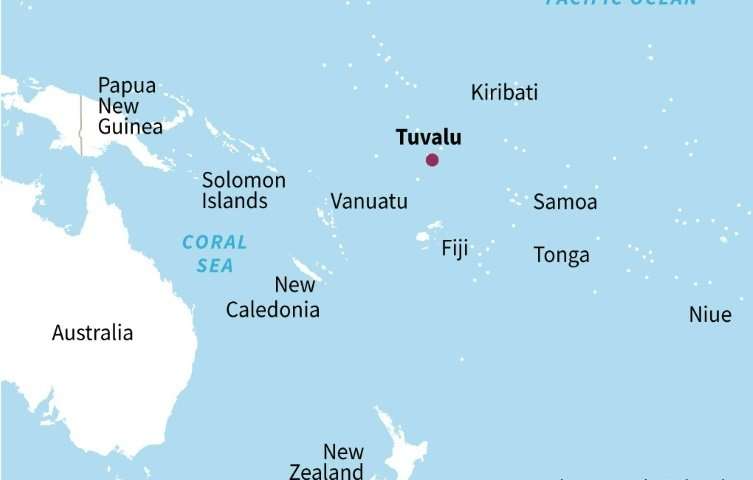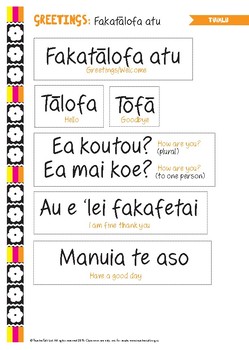Even in the earliest of days, there was quite a bit of canoeing between the islands. And of the nine islands, eight of them were inhabited. In the Tuvaluan language, Tuvalu means “eight standing together.”
Tuvalu is an island country in the South Pacific ocean, surrounded by Nauru and the Marshall Islands to the northwest; Kiribati to the northeast; Tokelau to the east; American Samoa to the southeast; Fiji to the south; Vanuatu to the southwest; and the Solomon Islands to the west. Of the nine islands that make up Tuvalu, three of these are reef islands and the remaining six are atolls. They generally have a wet and a dry season without much of a temperature change in average highs and lows. However, they are primed for dealing with the El Niño and La Niña weather effects, and even struggled through a drought where they had to ration off water several years ago.
Evidence shows that people migrated to these islands around 3000 years ago. Some islands believe their ancestors came from Samoa, others from Tonga. The Spanish were the first Europeans to sail past these islands. The British also sailed past and charted a few of the islands. They named the island of Funafuti Ellice’s Island after an English politician (I mean, he was also the owner of the ship’s cargo, too, so it sounds like he was just sucking up), but the name was later extended to all nine islands. Russians and Dutch expeditions also came across these islands and tried renaming them too. (Sorry, guys. This one’s taken.) For a couple years, Peruvian ships started landing in Tuvalu and other islands during the mid-1800s to engage in “blackbirding,” which is essentially taking people from these islands back to Peru with them to alleviate a labor shortage. At this same time, European missionaries were also landing in Tuvalu and introducing the islanders to Christianity. Once the religion was established on all the islands, it became a British protectorate (not sure if that was coincidental or in the plans). During the late 1800s, there were established foreign traders on the islands who would act as agents for different trading companies. There were also quite a few scientific explorations and travellers who stopped in Tuvalu, including the famous writer Robert Louis Stephenson and his wife. The British actually combined a few of their protectorates into one and created the Gilbert and Ellice Islands colony. The US Marines used several Tuvaluan islands as staging areas during WWII. During the mid-1970s, a referendum went to vote, and in 1978, Tuvalu gained its independence. Tuvalu has competed in several international sporting events (especially weightlifting and sprint running), dealt with tropical cyclones and natural disasters, and has been active in the conversations on climate change.
 |
| One of the main roads in Funafuti |
The capital of Tuvalu is the city of Funafuti, which is actually the name of the entire atoll. Nearly 60% of the country’s population lives on Funafuti, roughly about 6300 people. And while there are actually several villages on the atoll, the capital is often considered as the entire atoll. Not only does it include this atoll, but 29 other islets. There are a couple university extensions on Funafuti, and an airport with limited service (notably, its airport code is FUN, so you know exactly what you’re getting into. Cue up the Spongebob song).
For several years between the late 1990s and early 2000s, Tuvalu had one of the best economies among the South Pacific countries. But the global economic crisis of 2008 was a bit much for them, and growth slowed way down while inflation went up. Agriculture is still really important, especially with the cultivation of coconut products along with the commercialized fishing industry. Because of its remoteness and difficulties in traveling to and from this isolated country, tourism isn’t really all that great, but they do get quite a few ecotourists making their way through Tuvalu.
English is one of the official languages in Tuvalu, although hardly anyone really speaks it, except maybe for foreigners. Most people speak the other official language: Tuvaluan. It’s distantly related to languages in the Polynesian family like Hawaiian, Samoan, Tongan, Tahitian, and Maori. It’s pretty much spoken by everyone, except the island of Nui has its own language that’s a little closer to Gilbertese.
Tuvalu has its own state church: the Congregational Christian Church of Tuvalu. Nearly 97% of the population follow this church, even though their constitution lets you pick your religion or change religions or even decline religious instruction at school. There are also some other Christian churches there, like Roman Catholics, Seventh Day Adventists, and the Brethren Church. And with the introduction of Christianity to the islands during the mid-1800s, native animism essentially stopped. Mixed in among these, you’ll also find a small following of Baha’i and Muslim groups.
So, here’s my big thing I found out about Tuvalu. You know when you look at internet addresses, and they all have a domain name followed by the top-level domain: a dot and an ending, like .com (usually companies), .org (usually nonprofit organizations), .gov (government), .edu (schools, educational institutions), etc. But then there are a few other lesser used ones, like .co and .biz, but one I’ve seen on occasion is .tv. Well, apparently, when they were doling out top-level domain abbreviations for different countries, Tuvalu got .tv. And one of the main sources for Tuvalu’s revenue comes leasing out this domain name, which is now managed by Verisign until 2021. They also brought in a lot of revenue at one time from letting people/companies use their area code as a premium rate telephone number (think 1-900 numbers), but I’ve also read they got a lot of pushback being associated with sex hotlines and stuff, and they stopped doing this.
Up next: art and literature







No comments:
Post a Comment